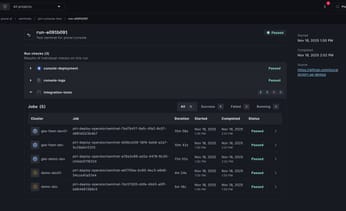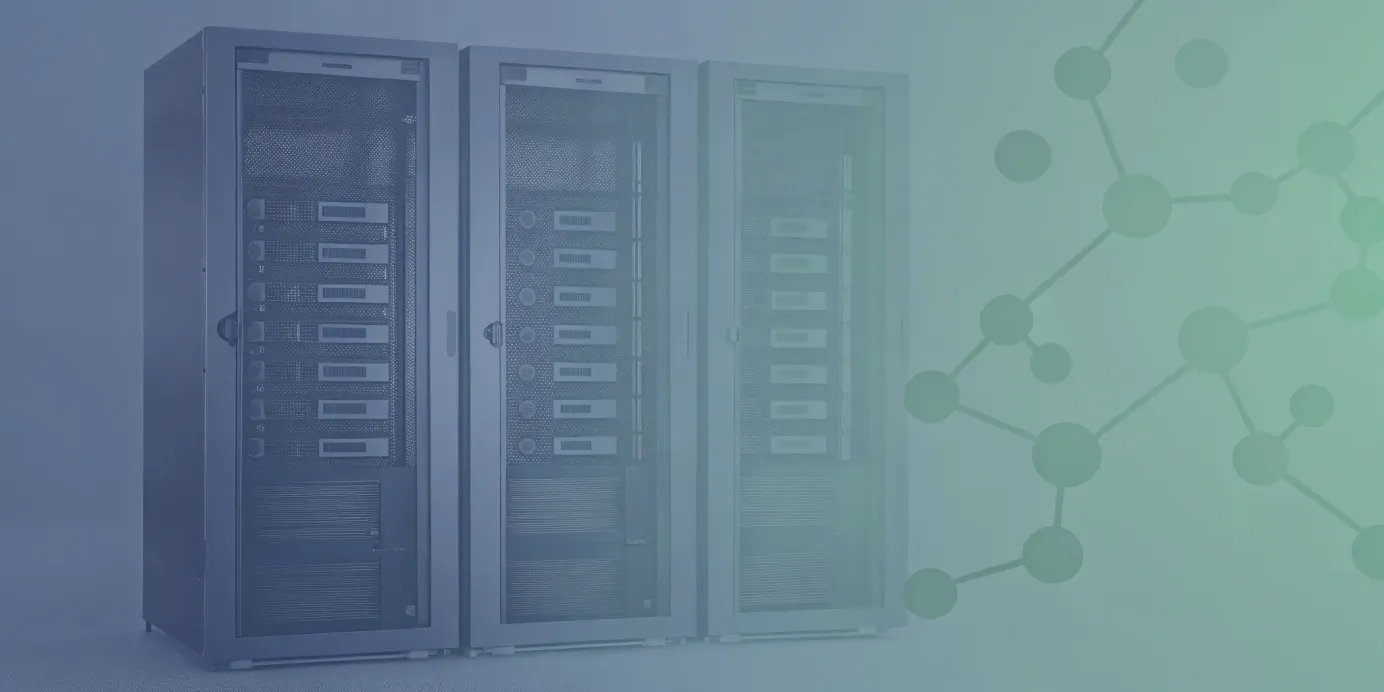
Canonical Kubernetes: Streamlined K8s for DevOps
Canonical Kubernetes is a CNCF conformant Kubernetes version delivered in a compact, secure, reliable snap package.
Kubernetes revolutionised container orchestration, allowing faster and more reliable application deployment and management. But even though it transformed the world of DevOps, it introduced new challenges around security maintenance, networking, and application lifecycle management.
After more than seven years of providing production-grade Kubernetes distributions, Canonical has consolidated its extensive experience delivering K8s for both developers and operations teams into a new solution: Canonical Kubernetes. This third Kubernetes distribution joins their existing offerings— Charmed Kubernetes and MicroK8s—combining the best of both worlds: ZeroOps for small clusters and intelligent automation for larger production environments.
This blog explores everything you need to know about Canonical Kubernetes and how it streamlines Kubernetes cluster management across diverse environments, from developer workstations, bare metal, and the cloud. We'll also examine how it complements solutions like Plural in addressing Kubernetes complexity challenges at scale.
Unified Cloud Orchestration for Kubernetes
Manage Kubernetes at scale through a single, enterprise-ready platform.
Key Takeaways
- Simplify Kubernetes experience: Canonical Kubernetes is pure upstream and works on any infrastructure, from a developer's workstation and bare metal to public clouds. Deploy single-node and multi-node clusters to support container orchestration, from testing to production.
- Long-term support and robust security: Canonical Kubernetes offers LTS options of up to 12 years, providing stability and security for production environments. Regular security updates and patches, delivered via snaps, enhance the platform's resilience.
- Simplify Kubernetes complexity: Plural helps teams run multi-cluster, complex K8s environments at scale, combining an intuitive, single pane of glass interface with advanced AI troubleshooting capabilities.
What is Canonical Kubernetes?
At its core, Canonical Kubernetes is a CNCF conformant, full implementation of upstream Kubernetes delivered in a compact, secure, reliable snap package. As the upstream Kubernetes services are not all that is required for a fully functional cluster, additional services and features are built in.
What is a snap?
Snaps are containerized software packages that bundle an application and its dependencies, making them easy to install, update, and run on various Linux distributions.
For example, many Kubernetes tools and core components (such as kubectl, kubeadm, kube-apiserver, kubelet, etc.) are distributed as snaps. This allows users to install and manage Kubernetes software easily using the snap command.
Snaps are self-contained, simple to install, secure, cross-platform, and dependency-free. They can be installed on any Linux system that supports the snapd service (see the snapd documentation for more info). Security and robustness are their key features, alongside being easy to install, maintain, and upgrade.
What else comes with it?
Canonical Kubernetes builds upon upstream Kubernetes by providing all the extra services to have a fully functioning cluster all in one convenient location - a snap!
- Container runtime: Canonical Kubernetes uses containerd by default, a lightweight and high-performance container runtime.
- CNI: Canonical Kubernetes includes a high-performance, advanced network plugin called Cilium.
- DNS: CoreDNS is the default DNS service, ensuring reliable service discovery within the cluster.
- Ingress controller: An ingress controller simplifies external access to your applications running within the cluster. Cilium is the default ingress, but popular options include Traefik and Nginx.
- And more: It also includes a simple storage provider, a gateway API controller, and a metrics server.

Canonical Kubernetes: Features and Benefits
Built on a foundation of open source innovation and backed by Canonical’s extensive support, it empowers organizations to deploy and manage Kubernetes clusters confidently across diverse environments, from developer workstations to large-scale cloud and data center infrastructures.
ZeroOps Experience
Canonical Kubernetes makes it easy to run a fully functional local Kubernetes cluster, giving developers a great installation experience. Like MicroK8s, Canonical Kubernetes is installed as a snap. You can get a single-node cluster with just two commands:
sudo snap install k8s --classic
sudo k8s bootstrap
Canonical Kubernetes comes with best-of-breed open source components for networking, local storage, DNS, load balancing, metrics, gateway, and ingress. This seamless integration simplifies cluster setup and management, delivering a robust, ready-to-use Kubernetes experience without the complexity of sourcing and configuring individual tools.
Long-term Support and Security
Canonical Kubernetes announced a 12 year security maintenance and support commitment starting with Kubernetes 1.32. Canonical Kubernetes LTS gives organizations complete control over their upgrade schedules. This extended support window reduces pressure to upgrade frequently, allowing teams to maintain a stable environment while aligning updates with business priorities and compliance needs.
Security is critical to any Kubernetes cluster. Canonical Kubernetes installs as a snap with a classic confinement level, enabling automatic patch upgrades to protect your infrastructure against known vulnerabilities. Additionally, Canonical Kubernetes aims to comply with security standards like FIPS, CIS, and DISA-STIG.
Automated Large-Scale Operations with Juju
Juju is an open-source orchestration engine that allows you to deploy, configure, scale, and operate Canonical Kubernetes on any infrastructure, from private/public cloud to bare metal. Juju uses charms, which are encapsulated, reusable software packages, to define how applications are deployed and related to each other.
Canonical Kubernetes comprises of two Juju charms: a control plane charm and a worker charm to get automated Kubernetes operations from bare-metal to the cloud managed by Juju. Build your Kubernetes cluster from the ground up, integrate it with your favorite tools, and create multi-cloud topologies.
Why Choose Canonical Kubernetes Over Other Distributions?
When it comes to selecting a Kubernetes distribution, organizations need a solution that combines reliability, security, scalability, and ease of management. Canonical Kubernetes stands out for several reasons:
- Unified Experience Across Environments: It provides the same APIs and operational experience whether running on a developer laptop, at the edge, or in a large-scale production cluster, reducing friction as workloads move through the development lifecycle.
- Snap-Based Packaging: The use of snaps ensures easy installation, automatic updates, and consistent deployments, which simplifies maintenance and enhances security.
- Lifecycle Automation: With built-in support for Juju, Canonical Kubernetes streamlines cluster creation, scaling, and upgrades, reducing operational burden for DevOps teams.
- Long-Term Support (LTS): Canonical offers extended maintenance and security updates, making it attractive for organizations with strict compliance and reliability requirements.
- Best-in-Class Open Source Components: The distribution includes everything needed for production workloads-networking, DNS, metrics, storage, ingress, and load balancing-right out of the box.
Canonical Kubernetes Meets Plural
Plural and Canonical Kubernetes are not mutually exclusive- they can be used together. Canonical Kubernetes is a Kubernetes distribution: it provides the core platform for running containerized workloads. Plural, meanwhile, simplifies the complexities of Kubernetes management with a platform designed to enhance efficiency, reduce operational challenges, and empower your teams to focus on innovation. Plural helps teams manage multi-cluster, complex K8s environments at scale.

Streamline Resource Updates and Deployments
Manual K8s operations can lead to errors, delays, and inefficiency. Plural leverages PR automation to eliminate tedious manual work, ensuring consistency and speed.
- PR-driven workflows to automate resource updates, deployments, and scaling.
- Sequential updates across development, staging, and production environments for safe rollouts.
- Full audit trails of every change are stored in Git for complete transparency.

Streamline code integration, testing, and deployment with pull request-driven automation and built-in quality checks for a seamless, auditable release process.
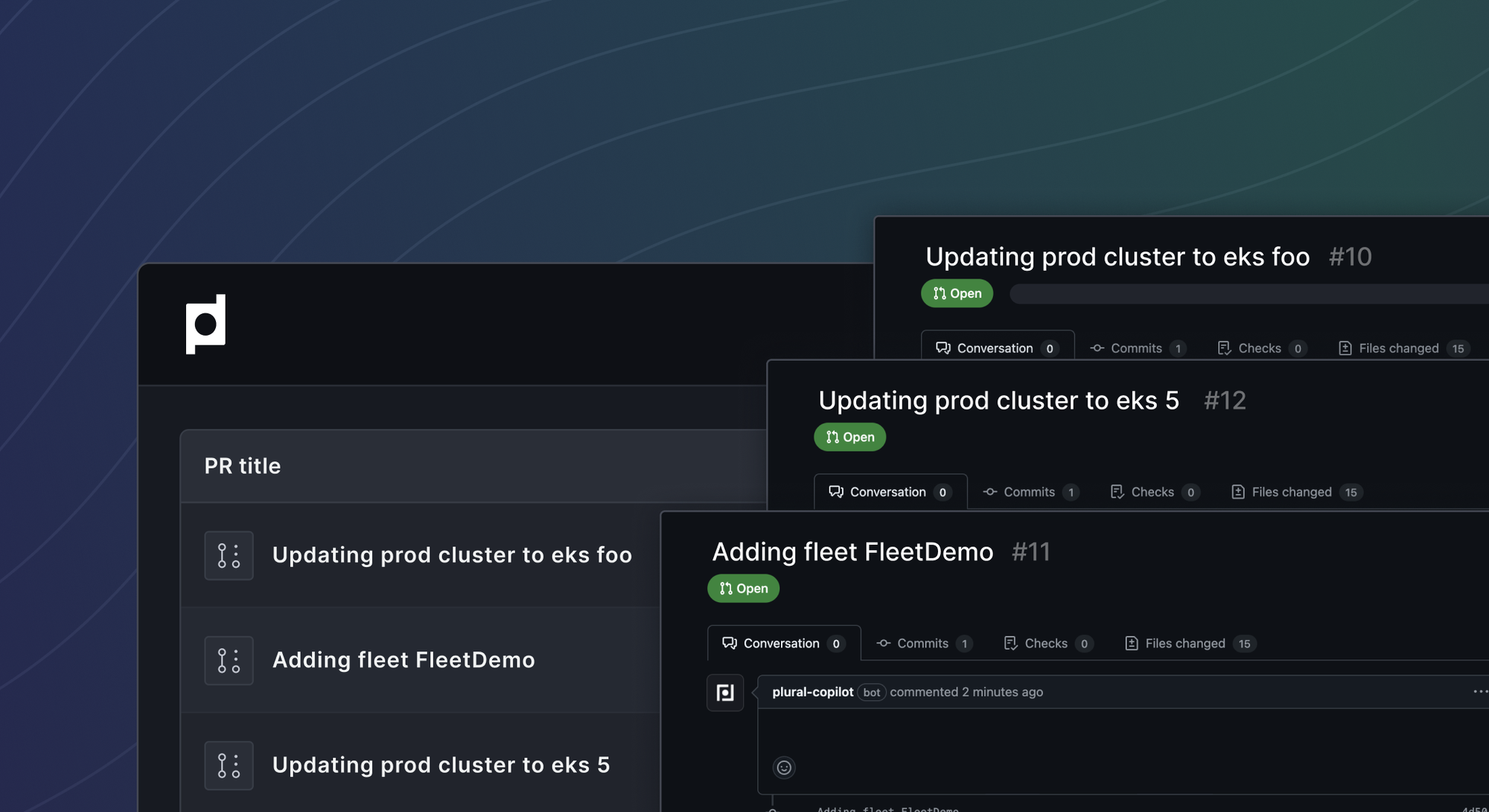
AI-driven Insights for Smarter Operations
Organizations struggle to find the expertise needed to manage complex K8s environments. Plural AI transforms Kubernetes management with AI-driven troubleshooting, intelligent remediation, and cost optimization. It automates debugging, suggests fixes, and integrates securely with major AI providers. Plural simplifies operations, enhancing efficiency and security for modern DevOps teams.

Leverage Plural’s unique real-time telemetry to automate diagnostics, receive precise fix recommendations, and inform your team with instant insights across all clusters.
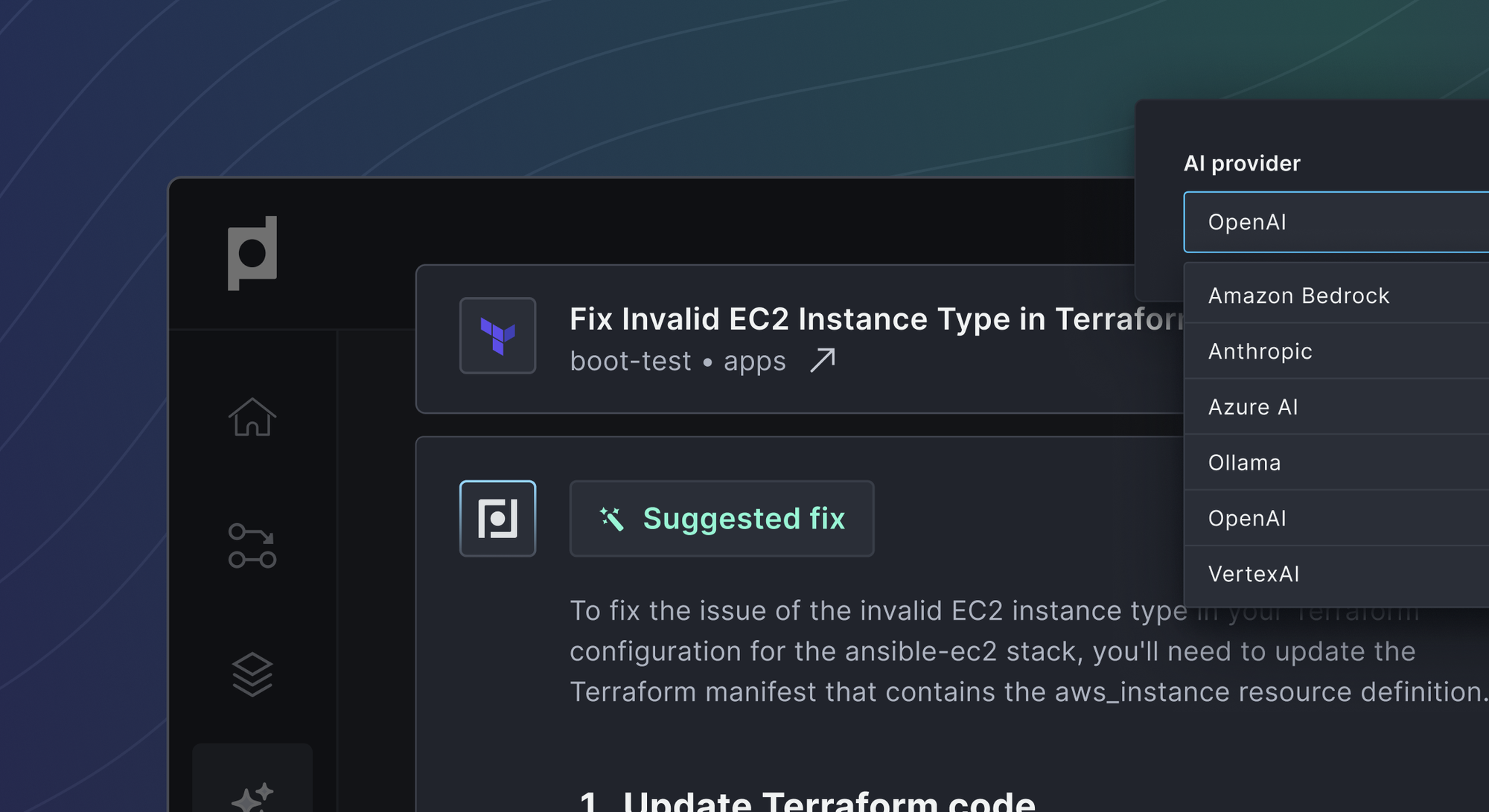
Simplify K8s Management with a Unified Interface
K8s complexity often stems from disconnected tools and fragmented workflows. Plural centralizes everything into a single, intuitive interface, making it easier to monitor and act.
- A single-pane-of-glass dashboard monitors cluster health, logs, and resource usage.
- Integrated policy enforcement, ensuring compliance at every stage.
- Flexible tagging and templating to streamline configuration and reduce rework.

Effortlessly simplify the complexities of Kubernetes management with a platform designed to enhance efficiency, reduce operational challenges, and empower your teams to focus on innovation.
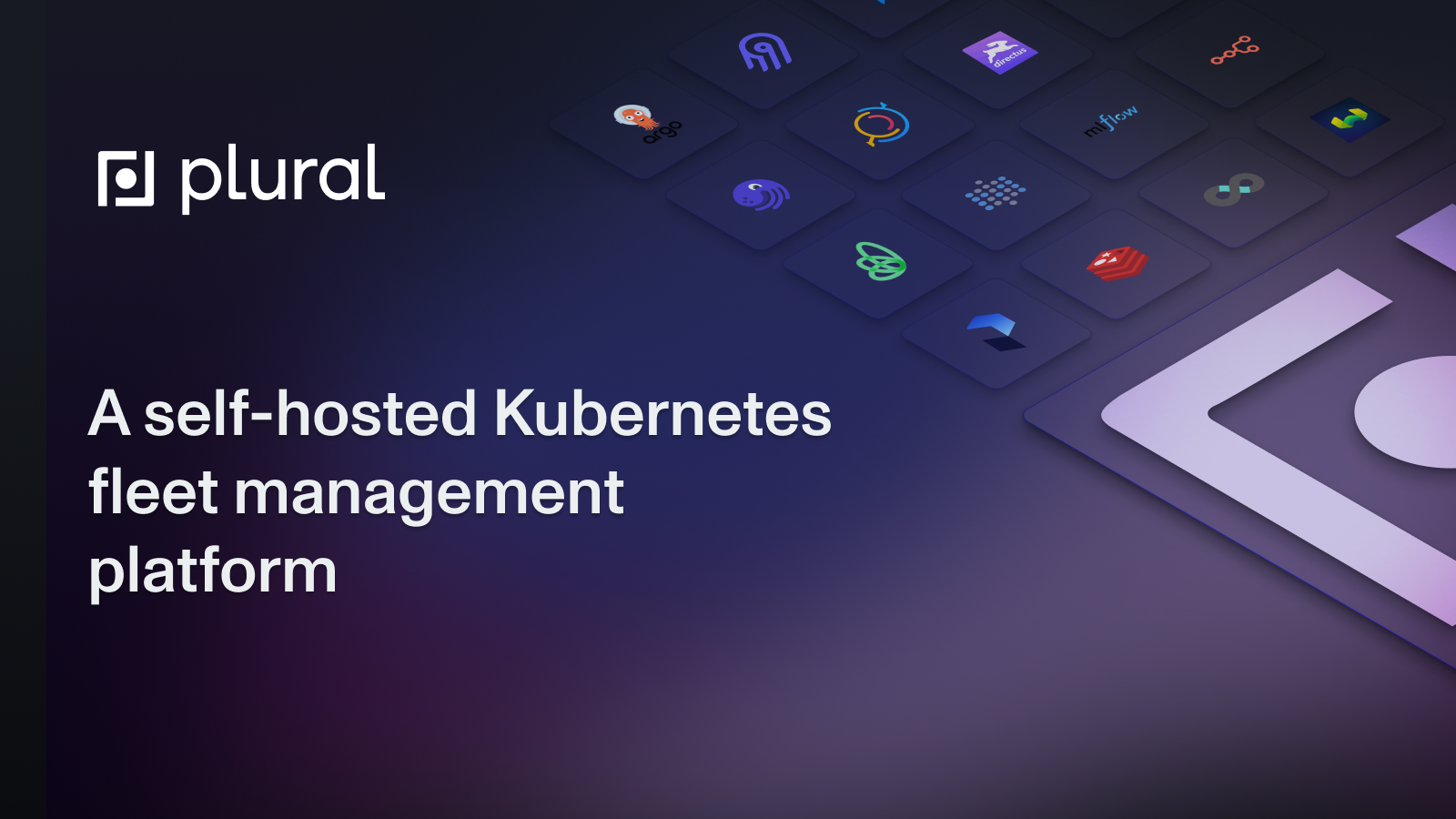
Conquer Heterogeneous Environments With Confidence
Managing K8s across on-premises, multi-cloud, and hybrid setups introduces challenges. Plural bridges the gap, providing the tools to standardize and scale across environments.
- GitOps-driven workflows to maintain consistency across heterogeneous environments
- Automated upgrades and compatibility checks for seamless operations
- Centralized policy enforcement to ensure secure, compliant configurations everywhere

One Console, All Your Logs
Most teams running Kubernetes face a common headache: logs are scattered across clusters, services, and tools. Platform teams spend too much time setting up log aggregation and governance, while developers spend hours jumping between
different interfaces to debug issues. Plural offers built-in log aggregation that lets you view and search logs directly in the Plural console. With proper access controls, you can query logs at the service and cluster levels.

Related Articles
- Docker and Kubernetes: DevOps Made Easy
- Deep Dive into Kubernetes Components
- Top Kubernetes Management Tools to Simplify K8s
- Top tips for Kubernetes security and compliance
Unified Cloud Orchestration for Kubernetes
Manage Kubernetes at scale through a single, enterprise-ready platform.
Frequently Asked Questions
How does Plural handle updates to my Kubernetes YAML manifests?
Plural uses a GitOps-based continuous deployment system. This means your manifests, whether written in Helm, Kustomize, or plain YAML, are continuously synced with your target Kubernetes clusters. Any drift is automatically detected and corrected, ensuring your clusters always reflect the desired state defined in your Git repository. This process is API-driven, allowing for automation and scaling to large fleets.
What are Plural Stacks, and how do they simplify infrastructure management?
Plural Stacks provides a Kubernetes-native, API-driven way to manage infrastructure as code (IaC) tools like Terraform. You define your stack configuration, linking it to a Git repository. Plural then automatically executes Terraform runs on the specified cluster for each commit, providing feedback on inputs, outputs, and state diagrams. This simplifies complex IaC workflows and integrates them seamlessly with your Kubernetes deployments.
How does Plural's embedded Kubernetes dashboard improve my workflow?
Plural's embedded dashboard simplifies access to your Kubernetes clusters by integrating with your existing single sign-on (SSO) provider. This eliminates the need to manage multiple kubeconfigs and VPNs. It also streamlines networking using the same secure, egress-only communication channel as the Plural agent, ensuring consistent and safe access to all your clusters, including private and on-premises environments.
Can I use Plural with my existing security and compliance tools?
Yes, Plural is designed to integrate with your existing security and compliance workflows. The platform supports role-based access control (RBAC) using your existing identity provider, allowing you to manage access to your Kubernetes resources through familiar mechanisms. Plural also facilitates policy enforcement using tools like OPA Gatekeeper, enabling you to define and enforce security best practices across your Kubernetes fleet.
What if I need help setting up or managing Plural?
Plural offers comprehensive documentation and support resources to help you get started and address any challenges. You can also book a time to see Plural in action and discuss your specific requirements with their team. They offer various support plans to meet the needs of organizations of all sizes, from startups to large enterprises.
Newsletter
Join the newsletter to receive the latest updates in your inbox.









